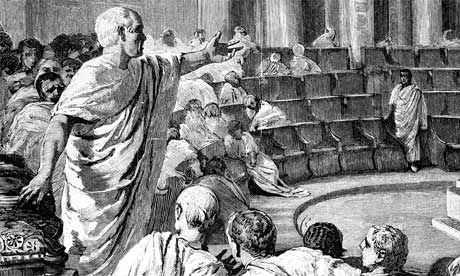Background Research
The senatus consultum, or the decree of the senate, had the force of law in order to consult with the senate instead of the people. Patres Conscripti was The Conscript Fathers or the Roman Senate. Catiline's camp at Faesulae, Etruria was run by Gaius Manlius, who was a centurion or professional officer, from Sulla's old army. Here at Etruria he assembled an army for Catiline.
Why Not Put Catiline to Death?
In this oration, Cicero continues to speak against Catiline. Cicero begins by comparing the decree of the senate to a sharp edge of authority that has been growing dull for 20 days(patimur habescere aciem horum auctoritatis). He then says the decree is enclosed in the records, like it was put away in a sheath(tamquam in vagina reconditum). This means that the power of the senate to kill Catiline has been decreasing over time just like their "sharp authority" was put away in a "sheath" or a cover for a sword. Cicero states that Catiline lives to increase audacity(vivis non ad depondemdam sed ad confirmandam audaciam). Lastly, in II.4, Cicero tells the conscript fathers that he desires to be merciful, but he doesn't want to be negligent to the danger of the state(me esse clementem, cupio in tantis rei publicae periculis non dissolutum...).
In II.5, Cicero mentions that Catiline established camp in Italy against the Roman population in Etruria(Castra sunt in Italia contra populum...), and it is dangerous because the number of enemies is growing(in dies singulos hostium numerus). The leader of the camp, Manlius, also is able to see the enemies within the camp walls(castrorum imperatorem ducemque hostium intra moenia). Next, Cicero justifies taking a lot of time in proving Catiline's guilt by saying that good people wouldn't worry about his timing, but random people who don't know him will think he is acting too cruelly(erit verendum mihi ne non potius omnes boni serius...).
In II.6, Cicero says that as long as someone is defending Catiline, he will live. However, he would live just as he is living now, being surrounded by Cicero's bodyguards so he wouldn't be able to rise against the republic(defendere audeat, vives, et vives ita ut nunc vivi, multis meis et frimis praesidiis...contra rem publicam). Cicero would also be able to send anyone in order to watch Catiline's actions.
Rhetorical Devices
Anaphora: the repetition of a word or words at the beginning of two or more sucessive clauses or sentences
ex. Nihilne te...nihil urbis...nihil timor...nihil concursus...nihil hic...nihil horum: Cicero uses this to repeatedly asks Catline whether or not he realized certain things
Hendiadys: a figure of speech in which 2 nouns are joined by a conjugation so one noun stands as an adjective to another
ex. "ora vultusque": the looks on the faces or the facial expressions
Praeteritio: a figure of speech in which one pretends to ignore something by mentioning it
ex. ...antiqua praetereo... Cicero isn't going to bring up what happended in the past, but he brings up C. Servilius ahala and Sp. Maelium.
Irony: use of words to express the opposite of the literal meaning
ex. fortes viri: it shows a difference in tim "the brave men"; "that brave men"
Twos and Threes: "why give one question, when you could give more"
ex. Quo usque... Quam diu...Quem ad finem?: Instead of asking one question, Cicero builds on the previous one by asking more questions.
Chiasmus: (comes from Greek chi) it interlocks word order
ex. Castrorum imperatorem(gen.) ducemque hostium
inclusum(PPP) in tabulis(abl. pw)... in vagina reconditum
Metaphor: a comparison that doesn't use like/as
ex. patimur hebescere aciem horum auctoritatis: the sharp edge of authority
Simile: a comparison using like/as
ex. tamquam in vagina reconditum: just as if it(the sharp edge) was put away in sheath

